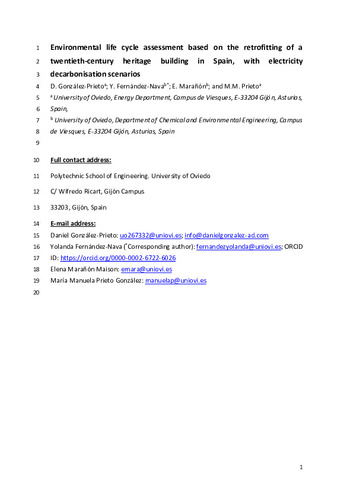Environmental life cycle assessment based on the retrofitting of a twentieth-century heritage building in Spain, with electricity decarbonization scenarios
Autor(es) y otros:
Fecha de publicación:
Editorial:
Taylor & Francis
Versión del editor:
Citación:
Descripción física:
Resumen:
The aim of this study is to estimate the environmental impacts associated with modernization measures that improve the energy efficiency of an office building listed as of cultural interest and located in northern Spain, a region with an Atlantic climate. European Climate Action for 2020-2030 sets a long-term goal of achieving neutrality of greenhouse gas emissions and towards the end of 2019 the Spanish Government presented its Integrated National Energy and Climate Plan. It is of interest to the international audience to know how energy policies can affect decisions on building retrofitting to improve sustainability: reduction in energy consumption, climate change and other environmental impacts. A life cycle assessment was carried out for the retrofitting of the building envelope and different energy supply scenarios: only electricity from the electricity mix (scenario of reference that of 2018, and decarbonisation scenarios proposed for 2020 and 2030), and the installation of heat pump and photovoltaic panels. The impacts will decrease 40% for Global Warming Potential and 15% for Cumulative Energy Demand in 2030 with respect to the reference scenario. These reductions will further increase up to 54 and 61%, respectively, if photovoltaic panels and a heat pump are implemented.
The aim of this study is to estimate the environmental impacts associated with modernization measures that improve the energy efficiency of an office building listed as of cultural interest and located in northern Spain, a region with an Atlantic climate. European Climate Action for 2020-2030 sets a long-term goal of achieving neutrality of greenhouse gas emissions and towards the end of 2019 the Spanish Government presented its Integrated National Energy and Climate Plan. It is of interest to the international audience to know how energy policies can affect decisions on building retrofitting to improve sustainability: reduction in energy consumption, climate change and other environmental impacts. A life cycle assessment was carried out for the retrofitting of the building envelope and different energy supply scenarios: only electricity from the electricity mix (scenario of reference that of 2018, and decarbonisation scenarios proposed for 2020 and 2030), and the installation of heat pump and photovoltaic panels. The impacts will decrease 40% for Global Warming Potential and 15% for Cumulative Energy Demand in 2030 with respect to the reference scenario. These reductions will further increase up to 54 and 61%, respectively, if photovoltaic panels and a heat pump are implemented.
ISSN:
Patrocinado por:
The authors wish to express their gratitude to the University Institute of Industrial Technology of Asturias (IUTA), the Ph.D. programme in Energy and Processes Control, University of Oviedo, and Gijon City Council for financial support under project SV-19-GIJÓN-1-06, which made this research study possible.
Ficheros en el ítem





